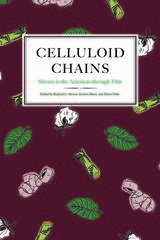

Winner, Rollins Book Award, Southwest Texas Popular Culture Association/American Culture Association, 2008
Science fiction film offers its viewers many pleasures, not least of which is the possibility of imagining other worlds in which very different forms of society exist. Not surprisingly, however, these alternative worlds often become spaces in which filmmakers and film audiences can explore issues of concern in our own society. Through an analysis of over thirty canonic science fiction (SF) films, including Logan's Run, Star Wars, Blade Runner, Back to the Future, Gattaca, and Minority Report, Black Space offers a thorough-going investigation of how SF film since the 1950s has dealt with the issue of race and specifically with the representation of blackness.
Setting his study against the backdrop of America's ongoing racial struggles and complex socioeconomic histories, Adilifu Nama pursues a number of themes in Black Space. They include the structured absence/token presence of blacks in SF film; racial contamination and racial paranoia; the traumatized black body as the ultimate signifier of difference, alienness, and "otherness"; the use of class and economic issues to subsume race as an issue; the racially subversive pleasures and allegories encoded in some mainstream SF films; and the ways in which independent and extra-filmic productions are subverting the SF genre of Hollywood filmmaking.
The first book-length study of African American representation in science fiction film, Black Space demonstrates that SF cinema has become an important field of racial analysis, a site where definitions of race can be contested and post-civil rights race relations (re)imagined.

Featuring a variety of disciplinary perspectives and analytical approaches, Celluloid Chains is the most comprehensive volume to date on films about slavery. This collection examines works from not only the United States but elsewhere in the Americas, and it attests to slavery’s continuing importance as a source of immense fascination for filmmakers and their audiences.
Each of the book’s fifteen original essays focuses on a particular film that directly treats the enslavement of Africans and their descendants in the New World. Beginning with an essay on the Cuban film El otro Francisco (1975), Sergio Giral’s reworking of a nineteenth-century abolitionist novel, the book proceeds to examine such works as the landmark miniseries Roots (1977), which sparked intense controversy over its authenticity; Werner Herzog’s Cobra Verde (1987), which raises questions about what constitutes a slavery film; Guy Deslauriers’s Passage du milieu (1999), a documentary-style reconstruction of what Africans experienced during the Middle Passage; and Steve McQueen’s Oscar-winning 12 Years a Slave (2013), which embodies the tensions between faithfully adapting a nineteenth-century slave narrative and bending it for modern purposes.
Films about slavery have shown a special power to portray the worst and best of humanity, and Celluloid Chains is an essential guide to this important genre.

Drawing on a range of comparative readings by writers, theorists, and filmmakers, including John Edgar Wideman, Frantz Fanon, Richard Wright, Issac Julien, Alain Locke, and Sidney Poitier, Haunted Life is a bold and original exploration of the legacies of black visual culture and the political, deeply sexualized violence that lies buried beneath it.

READERS
Browse our collection.
PUBLISHERS
See BiblioVault's publisher services.
STUDENT SERVICES
Files for college accessibility offices.
UChicago Accessibility Resources
home | accessibility | search | about | contact us
BiblioVault ® 2001 - 2024
The University of Chicago Press









